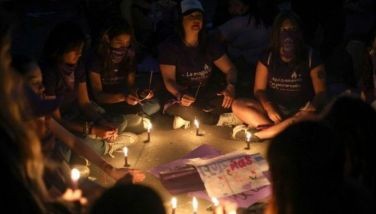UN chief urges equality for women by 2030, says men are key
UNITED NATIONS — U.N. Secretary-General Ban Ki-moon challenged all governments Monday to reach the goal of equality for women by the year 2030, saying the key is getting men to change their "mindsets."
Twenty years after 189 nations adopted a platform to achieve equality for women, the United Nations chief warned that progress is too slow "and our gains are not irreversible."
"Our goal must be: 50:50 by 2030," Ban said at the opening session of the U.N. Commission on the Status of Women, which is reviewing progress toward gender equality since the groundbreaking 1995 U.N. women's conference in Beijing.
While more girls are being educated and maternal mortality has been almost halved, Ban said women and girls still suffer disproportionately from sexual violence, displacement during conflicts, persecution, attacks by extremist groups and economic turmoil.
Ban challenged all governments and men and women everywhere to finish Beijing's work and achieve gender equality by 2030, which he said will be a new U.N. development goal.
He cautioned, however, that "without changing the mindset of men we may not be able to change this current situation."
Twenty years ago, delegates in Beijing expected to achieve gender equality by 2005, said Phumzile Mlambo-Ngucka, the executive director of UN Women.
Since then, many countries have changed their laws and constitutions to promote women's rights and equality of the sexes. What hasn't changed, Mlambo-Ngucka lamented, are "the attitudes that perpetuate the culture of male superiority and the stereotypes that diminish women."
"Power relations between men and women must change profoundly," Mlambo-Ngucka said. "Men must be partners in the pursuit of gender equality, in their decision-making roles, as heads of state, CEOs, religious and cultural leaders, and as partners and parents."
She called for addressing "customary laws" that diminish women's rights and roles — such as those allowing female circumcision — eliminating the "global epidemic" of violence against women and girls, ending unequal pay and banning child marriage.
In many regions, "we must understand and confront the growing conservative and extremist resistance to gender equality," Mlambo-Ngucka said. "We see this in ongoing attacks on girls' education, women's public participation and women's control over their bodies."
The 150-page Beijing platform broke new ground, recognizing that women's rights — including sexual rights — are human rights, said Patricia Licuanan who chaired the committee that drafted the text. But the reality around the world is that such issues remain highly contentious, Licuanan said in the keynote speech Monday.
The lives of women have been afflicted by "religious and ethnic fundamentalisms and the growing armed conflict and rise of terrorism," said Licuanan, who is now the Philippines Minister of Higher Education.
To reach gender equality, she called for greater use of new technology, development of new strategies, and stronger partnerships with men, other women, technocrats and activists, civil society and social movements.
The 45-nation Commission on the Status of Women adopted a political declaration at the opening session calling for accelerated implementation of the Beijing platform, which focused on 12 areas ranging from impoverished women, to economic and political participation and the difficulties facing girls.
The declaration, adopted by acclamation, expresses concern "that progress has been slow and uneven and that major gaps remain." It commits the commission "to strive for the full realization of gender equality and the empowerment of women by 2030."
Mlambo-Ngucka said China and UN Women will co-host a meeting of world leaders on Sept. 26 to promote "truly bold actions" to achieve far-reaching progress toward the goal by 2020.
"In 2030 we want to be able to talk about a world that has achieved gender equality," she said. "A 50:50 planet."
- Latest
- Trending






























